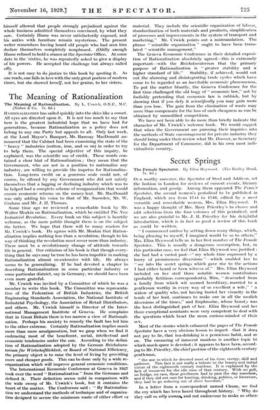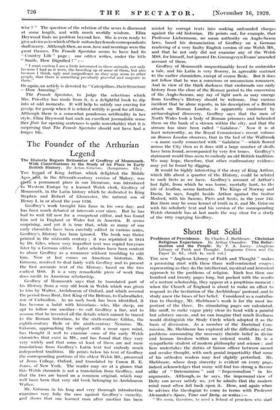Secret Springs
The Female Spectator. By Eliza Heywood. (Tho Bodley Head. 7s. &I.)
OUR worthy ancestor, the Spectator of Steel and Addison, set the fashion in London for reviews of current events, literary information, and gossip. Among them appeared The Fema-c
Spectator, the second women's periodical to be published in England, which ran from 1744 to 1746, edited by a most versatile and remarkable woman, Mrs. Eliza Heywood. It was a happy thought of Mrs. Mary Priestley's to choose and edit selections from the four volumes of this periodical, and we are also grateful to Mr. J. B. Priestley for his delightful introduction, which is in fact as good a review of this book as could be written.
I commenced author by setting down many things, which, being pleasing to myself, I imagined would be so to others," Mrs. Eliza Heywood tells us in her first number of The Female Spectator. This is usually a dangerous assumption, but, in this particular case, we feel that Eliza Heywood was justified : she had had a varied past—" my whole time engrossed by a hurry of promiscuous diversions "—which enabled her to " see into the secret springs which gave rise to the actions.
I had either heard or been witness of." Mrs. Eliza Heywood included on her staff three notable women contributors (probably fictitious correspondents), Mira, " descended from a family from which wit seemed hereditary, married to a gentleman worthy in every way of so excellent a wife," `' a widow of quality who, not having buried her vivacity in the tomb of her lord, continues to make one in all the modish diversions of the times," and Euphrosine, whose beaut• was the least distinguished part of her. Eliza Heywood and her three exceptional assistants were very competent to deal with the questions which beset the more curious-minded of their sex.
Most of the stories which enhanced the pages of The Female Spectator have a very obvious lesson to impart—that it does not pay to lie, that tea-drinking is a pernicious habit, and so on. The ensnaring of innocent maidens is another topic to which much space is devoted ; it appears to have been, accord- ing to Mr. Priestley, the chief pastime of the eighteenth-century gentleman,
" the one to which he devoted most of his time, energy, skill and patience. This fact is not really a tribute to the beauty and initial virtue of the eighteenth century maidens. It is explaine;d by the lack of resources for the idle man of that century. With no golf, no bridge, no ears, these gentlemen had to pass the day somehow, and if they did not care for hunting, drinking, politics, or literature, they had to go seducing out of sheer boredom."
In a letter from a correspondent named Cleora, we find the cry -which has been heard throughout history. -" Why do they call us silly women, and not endeavour to make us other-
wise ? " The question of the relation of the sexes is discussed at some length, and with much worldly wisdom. Eliza Heywood finds no problem beyond her. She is even ready to give advice as to which of their suitors her female correspondents shall marry. Although then, as now, love and marriage were the great themes, The Female Spectator seems to have had its
Country Life " page ; one editor writes, under the title " Snails, How Dignified ! " :—
" I must confess I am a little interested in those animals, not only because I had as it were, the breeding up of some of them, but also because I think, ugly and insignificant as they may seem to other people, that there is something peculiarly graceful and majestic in them."
Or again, an article is devoted to " Caterpillars, their Structure —How Amazing."
The Female Spectator, to judge the selections which Mrs. Priestley has made from it, is a delightful book to dip into at odd moments. It will help to satisfy our craving for gossip, for gossip when it is related wittily is good for all time, Although there is a somewhat ponderous artificiality in her style, Eliza Heywood had such an excellent journalistic sense (her flair for opening sentences is quite remarkable) that it is surprising that The Female Spectator should not have had a longer life.









































 Previous page
Previous page